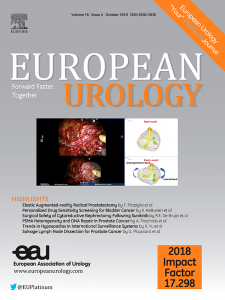转移性阉割耐药前列腺癌的强化方法和治疗顺序:系统综述。
IF 25.3
1区 医学
Q1 UROLOGY & NEPHROLOGY
引用次数: 0
摘要
背景和目的:最近,有关强化治疗的研究势头强劲,三种新型疗法组合已被批准用于治疗转移性去势抵抗性前列腺癌(mCRPC)。本系统性综述总结了围绕mCRPC强化治疗策略的现有和新出现的证据,并为理想的治疗排序提供指导:方法:本综述遵循《系统综述和荟萃分析协议首选报告项目》(PRISMA-P)指南。在2024年5月15日之前,对PubMed、EMBASE、Web of Science、Cochrane Library、ClinicalTrials.gov和主要国际学会的在线论文集进行了全面检索,检索词涉及mCRPC的治疗强化和排序:本综述共纳入了28项临床试验和24项正在进行的强化治疗研究。根据雄激素受体通路抑制剂(ARPIs)与多西他赛或不与多西他赛联合用于早期疾病状态的情况,概述了已获批准的mCRPC治疗最佳排序算法。在一线治疗中,多聚(ADP-核糖)聚合酶抑制剂+ARPI联合疗法可提高无放射进展生存期(rPFS),尤其是对那些有BRCA1/2基因改变的患者。ipatasertib+阿比特龙的AKT抑制剂组合可延长PTEN缺失或PIK3CA/AKT1/PTEN改变患者的rPFS。对于有两个或两个以上恩杂鲁胺早期进展风险因素的患者,放射性核素177-Lu-PSMA-617+恩杂鲁胺可延长无进展生存期。本文讨论了正在进行的mCRPC强化方法研究,以及现有和潜在的预测和预后生物标志物:最近批准的单药和强化治疗方法以及正在进行的研究将不断改变mCRPC的治疗格局。应用公认的基因组、分子和临床预测及预后指标改进患者资料分析是优化现有疗法顺序使用的基础。本文章由计算机程序翻译,如有差异,请以英文原文为准。
Intensification Approaches and Treatment Sequencing in Metastatic Castration-resistant Prostate Cancer: A Systematic Review
Background and objective
Recently, research on treatment intensification has gathered momentum, and three novel therapy combinations were approved for metastatic castration-resistant prostate cancer (mCRPC). This systematic review summarizes the current and emerging evidence around intensified strategies for mCRPC and provides guidance for an ideal therapeutic sequencing.
Methods
Preferred Reporting Items for Systematic Review and Meta-analysis Protocols (PRISMA-P) guidelines were followed to perform this review. PubMed, EMBASE, Web of Science, Cochrane Library, ClinicalTrials.gov, and major international societies’ online proceedings were searched comprehensively until May 15, 2024, for terms related to treatment intensification and sequencing for mCRPC.
Key findings and limitations
Overall, 28 clinical trials and 24 ongoing studies of intensification treatments were included in this review. Algorithms of optimal sequencing of approved treatments for mCRPC were outlined according to the use of androgen receptor pathway inhibitors (ARPIs) with or without docetaxel for earlier disease states. In first line, poly(ADP-ribose) polymerase inhibitor + ARPI combinations improve radiographical progression-free survival (rPFS), particularly for those with BRCA1/2 alterations. The AKT inhibitor combination of ipatasertib + abiraterone extends rPFS in those with PTEN loss or PIK3CA/AKT1/PTEN alterations. In those with two or more risk factors for early progression on enzalutamide, radionuclide 177-Lu-PSMA-617 + enzalutamide prolongs progression-free survival. Ongoing research of intensified approaches for mCRPC, and available and potential predictive and prognostic biomarkers are discussed.
Conclusions and clinical implications
Recent approvals and ongoing investigations of single agents and intensification approaches will keep transforming the mCRPC treatment landscape. Improvement of patient profiling applying recognized genomic, molecular, and clinical predictive and prognostic indicators is fundamental to optimize sequential use of available therapies.
求助全文
通过发布文献求助,成功后即可免费获取论文全文。
去求助
来源期刊

European urology
医学-泌尿学与肾脏学
CiteScore
43.00
自引率
2.60%
发文量
1753
审稿时长
23 days
期刊介绍:
European Urology is a peer-reviewed journal that publishes original articles and reviews on a broad spectrum of urological issues. Covering topics such as oncology, impotence, infertility, pediatrics, lithiasis and endourology, the journal also highlights recent advances in techniques, instrumentation, surgery, and pediatric urology. This comprehensive approach provides readers with an in-depth guide to international developments in urology.
 求助内容:
求助内容: 应助结果提醒方式:
应助结果提醒方式:


